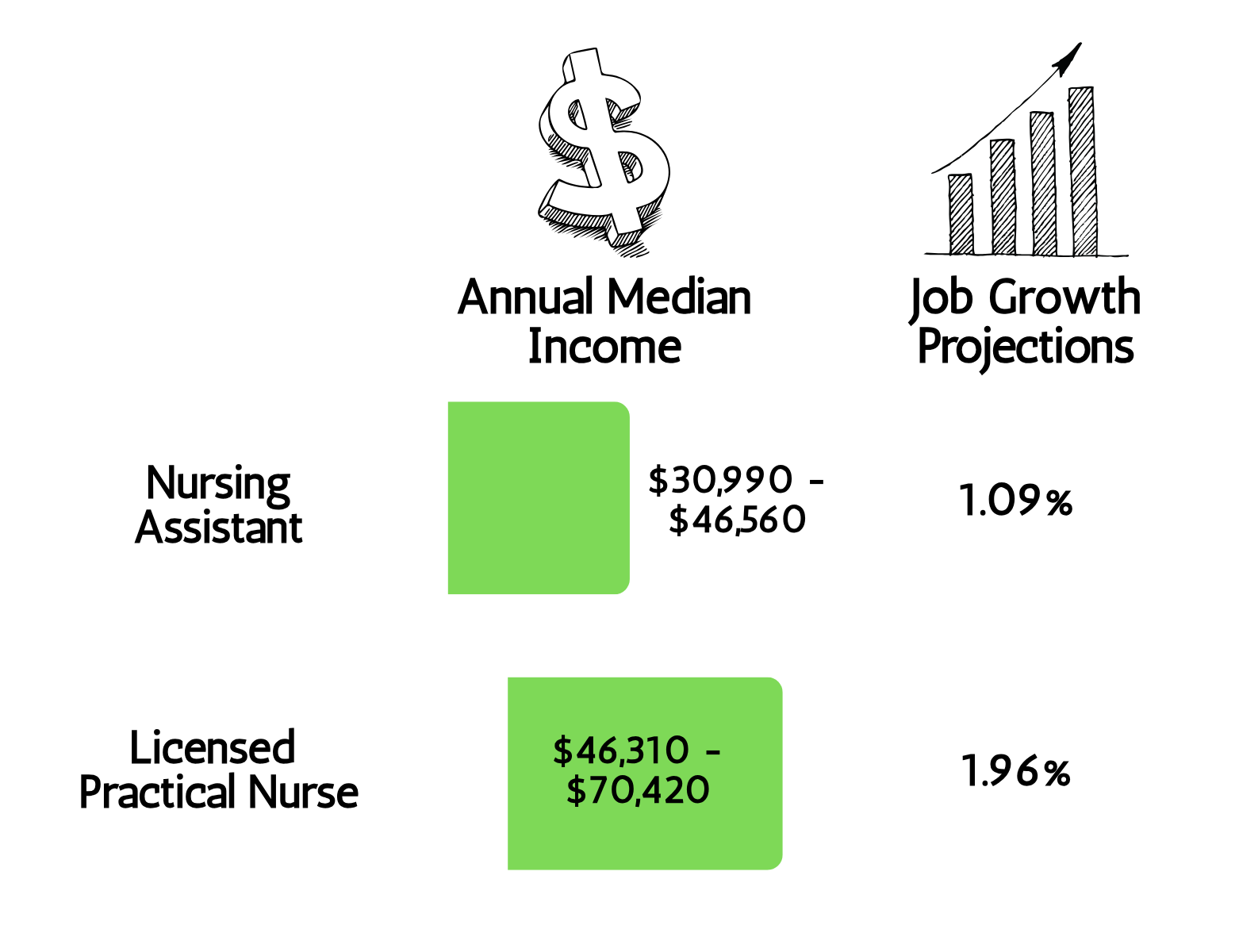Careers as a Nursing Assistant:
Be the Heart of Healthcare
Do you enjoy helping others, especially during difficult times? Do you find meaning in making a positive impact on people’s lives? If so, a career as a nursing assistant in behavioral health might be a great fit. Nursing assistants are caring, dependable, and patient. They provide hands-on support with tasks like bathing, eating, and getting dressed—offering comfort and dignity to those in need.
Many people choose this career to make a real difference and to enter the healthcare field quickly. Some use it as a first step toward becoming a nurse or other health professional, while others find lasting purpose in the relationships they build with patients. In Ohio, nursing assistants play a key role in behavioral health settings by supporting individuals with mental health challenges and helping them feel safe, respected, and cared for every day.
Is Working as a Nursing Assistant for You?
Learn More About Nursing Assistant Careers:
What is an STNA?
National Association of Health Care Assistants (NAHCA)
How to Become a Licensed Practical Nurse
US Bureau of Labor Statistics
Nursing Assistants (Career OneStop)
Nursing Assistants (O*Net Online)
Licensed Practical Nurse (Career OneStop)
Licensed Practical Nurse (O*Net Online)
Learn More About Credentials and Licensure:
Ohio Department of Health Nurse Aid Training
Ohio Board of Nursing Licensing & Certification
List of LPN Training Programs
Nurse Aide Training Program locations
*Please note that the job recommendations listed throughout this page will vary by agency and county, as some may require additional training or licensure.
Your Path to a Career in ASSISTANT NURSING
What does it take?
Get Educated
Get Experience
Get Credentialed/ Licensed*
Get Ahead
*Credentials/Licenses are offered by the State of Ohio or other National Organizations. They show you’re a trusted professional in the field.
Income varies and is based on role, location, experience, education, and licensing/credentials. Job growth projections are for 2023-2033. Ohio LMI
Salary ranges are based on what’s currently available through Zip Recruiter, Indeed, Career One Stop, or Salary Expert.

Get more info in the FAQs
ASSISTANT NURSING PROFESSIONALS - FAQ
-
Meaningful Impact: Help individuals navigate mental health challenges and improve their quality of life.
Diverse Work Environments: Opportunities to work in hospitals, clinics, residential facilities, and community centers.
Team Collaboration: Work alongside a dedicated team of healthcare professionals.
Personal Growth: Develop strong communication, empathy, and problem-solving skills.
Job Stability: Consistent demand for assistant nursing roles in the behavioral health sector.
Embarking on this career path offers both personal fulfillment and professional stability.
-
With a high school diploma/GED and training program:
Nursing Assistant (also called STNA or CNA)
Nursing assistants help patients with everyday needs like eating, bathing, dressing, and moving around. They take vital signs (like temperature and blood pressure) and report changes to nurses. They work under the supervision of registered nurses (RNs) or licensed practical nurses (LPNs) and play a big role in keeping patients comfortable and safe.
Licensed Practical Nurse (LPN)
LPNs provide basic medical care, such as giving shots, changing bandages, and helping with medications. They check on patient’s health and report any changes to doctors or RNs. LPNs often work in hospitals, nursing homes, or clinics and may supervise nursing assistants. They need to pass a national exam and be licensed to practice.
Other job titles you may see:
Licensed Vocational Nurse (LVN)
Licensed Practical Nurse IV Credentialed (LVN-IV)
Certified Nursing Assistant (CNA)
State Tested Nursing Assistant (STNA)
Patient Care Assistant (PCA)
Acute Care Technician (ACT)
These roles offer opportunities for career advancement and specialization within the behavioral health field.
-
Assistant nurses play a crucial role in delivering compassionate care and supporting patients' recovery journeys.
Monitor Patient Behavior: Observe and report changes in patients' mental and emotional states.
Assist with Daily Activities: Help patients with tasks like bathing, dressing, and eating.
Support Treatment Plans: Implement care strategies developed by healthcare teams.
Provide Emotional Support: Offer a listening ear and encouragement to patients.
Ensure Safety: Maintain a secure environment for patients and staff.
-
Psychiatric and general hospitals with behavioral health units
Residential Treatment Centers
Community Health Clinics
Emergency Rooms
Schools
Home Care
Assistant nurses have the flexibility to work in various settings, each offering unique experiences and challenges.
-
Adults with Mental Health Disorders: Individuals dealing with conditions like depression, anxiety, or schizophrenia.
Children and Adolescents: Young individuals facing behavioral or emotional challenges.
Elderly Patients: Seniors experiencing cognitive decline or mood disorders.
Substance Abuse Patients: Individuals undergoing treatment for addiction.
Veterans: Former military personnel coping with PTSD or other mental health issues.
Assistant nurses provide essential care to a diverse patient population, addressing a wide range of behavioral health needs.
-
With your high school diploma or GED and some additional training, you can get started!
State Tested Nursing Assistant (STNA): Complete a state-approved nurse aide training program (which usually takes about 12 weeks) and pass the competency evaluation exam.
Licensed Practical Nurse (LPN): Graduate from an accredited practical nursing program (which usually takes one year) and pass the NCLEX-PN exam. Ongoing education is needed for license renewal.
Both roles require a commitment to education and ongoing professional development.
-
State Tested Nursing Assistant (STNA): Certification through the Ohio Department of Health's Nurse Aide Registry.
Licensed Practical Nurse (LPN): Licensure by the Ohio Board of Nursing, with options for additional certifications in specialized areas.
Obtaining the necessary credentials is essential for practicing legally and effectively in Ohio.
Click here to learn more about licenses, credentials, and certifications.
Disclaimer: The information provided on this website is accurate to the best of our knowledge at the time of publication. If you notice any errors or outdated information, please contact accounts@mhaadvocacy.org so we can make the necessary corrections.


